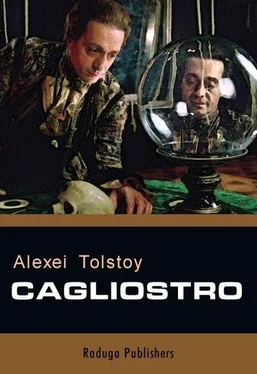They were the guests. They had long changed their wet clothes, had had a rest, and were now evidently dressing for dinner. Alexei watched the movement of the shadows on the curtains with impatience. The smell of the rain, the flowers and the burning candles made him dizzy.
And now the long shadow of the servant appeared again, it bowed and vanished, and measured steps were heard in the house. Alexei stepped back from the door. In came a tall, perfectly black man, the whites of his eyes like hard-boiled eggs. He had on a long raspberry-red robe belted with a scarf, and another scarf was wound round his head. With a deferential, yet dignified bow he said in broken French:
"My master salutes you, sir, and has asked me to tell you that he accepts your invitation to have supper with you with exceptional pleasure."
Alexei smiled and, coming close to him, asked: "Tell me please what is your master's name and title?"
With a sigh the servant dropped his head "I do not know."
"What do you mean-you don't know?" "His name has been concealed from me."
"Oh, I can see you're a rogue, my good man. But then your own name, at least, can you tell me?"
"Margadon."
"What are you-an Ethiopian?"
"I was born in Nubia," Margadon replied calmly, looking down on Alexei. "In the reign of Pharaoh Amenkhosiris I was taken prisoner and sold to my master."
Alexei backed away from him and frowned.
"What nonsense are you telling me? How old are you then?"
"Over three thousand."
"See if I don't tell your master to have you flogged properly for this!" cried Alexei, flushing an angry red. "Get out!"
Margadon bowed as deferentially as before and walked out. Alexei cracked his fingers as he pulled himself together, then he pondered for a moment and burst out laughing.
At this very moment the servant boy flung open both halves of the carved door, and into the room came a gentleman with a lady on his arm. Bows and introductions began.
The gentleman was perhaps in his fifties and solidly built. His purplish-red face with a hooked nose was cushioned in lace. His huge wig with locks, of a style worn at the dawn of the century, was carelessly powdered. His coat of stiff blue silk was embroidered in gold thread with masks and flowers. On top of this coat he wore a green overcoat lined with blue foxes. His black stockings were also embroidered with gold thread. Diamonds sparkled on the buckles of his velvet shoes, and each finger of his blunt, hairy hands was adorned with two or even three precious rings.
In a duskish deep voice this gentleman greeted his host, and then, moving a step aside from the lady, presented her.
"Countess-our host. Sir-my wife."
This done, he busied himself with his snuff-box, sniffing, blowing his nose, and throwing back his head. Alexei expressed his regret to the Countess on account of the bad weather and his keenest delight which this unexpected acquaintance with them afforded him. He offered her his arm, and led the way to the table.
The Countess answered him in monosyllables and seemed tired and depressed. But even so she was startlingly lovely. Her blond hair was dressed simply. Her face, a face of a child rather than that of a woman, seemed transparent, for so soft and clear was the skin; she kept her eyelids modestly lowered over her blue eyes, and her sweet mouth slightly parted-she must have been gladly breathing in the freshness pouring in from the garden.
Fedosia Ivanovna met the guests at the table laden with cold and hot dishes. Her French was poor, the guests did not speak Russian at all, and so Alexei had to do all the talking. The guests, it appeared, were travelling from St. Petersburg to Warsaw without changing horses and had already been on the road for two weeks.
"Do forgive me," said Alexei, "but I did not quite get your name."
"Count Fenix," replied the guest, greedily plunging his strong white teeth into a chicken leg.
Alexei quickly set down the glass that had started shaking badly in his hand, and turned whiter than his napkin.
"Then you are the celebrated Cagliostro whose miracles the whole world is talking about?" asked Alexei.
Count Fenix raised his shaggy greying eyebrows, poured some wine into his glass and poured it down his throat, without gulping.
"Yes, I'm Cagliostro," he said, complacently smacking his thick lips. "The whole world is talking about my wonders. But that comes from ignorance. There are no wonders. Just knowledge of natural elements, that is to say: fire, water, earth and air; the substances of nature, that is, the solid, the liquid, the soft, and the volatile; the forces of nature: attraction, repulsion, motion and tranquillity; the elements of nature of which there are thirty six, and finally the energy of nature: electric, magnetic, light, and sensitive. All this is subordinate to three things: knowledge, logic and will, which are contained right here," at this, he banged himself on the forehead. He put his napkin down on the table, took a golden toothpick out of his waistcoat pocket, and went to work at his teeth with a determined air.
Alexei watched him like a timid little rabbit. Dinner over, he took the guests to the library where logs were blazing in the fireplace, driving away the evening damp. Fedosia Ivanovna, who had not understood a word throughout dinner, stayed behind in the dining-room to see to things.
Cagliostro sat down in a leather armchair and between pinches of snuff held forth on the beneficial effects of a good digestion. The Countess seated herself on a small chair near the fireplace and gazed at the fire, deep in thought. Her hands, folded in her lap, sank in the blue silk of her gown.
"My friend, a doctor of philosophy who died in Nuremberg in fourteen… What a cursed memory," muttered Cagliostro, drumming his fingers on his snuffbox, "my friend, Doctor Bombastus Theophrastus Paracelsus, told me again and again: chew, chew, chew, – that is the first commandment of the wise: chew…"
Alexei glanced at him in puzzlement, but the very next moment, as it often happens in dreams, the inconceivable merged effortlessly with reality, he felt slightly dizzy for a moment as his mind took it in, but the dizziness passed at once.
"I, too, have often heard, Your Excellency, that a good digestion inspires happy thoughts and a poor digestion plunges one into sadness and even causes hypochondria," said Alexei. "However, there are other reasons besides…"
"Undoubtedly," said Cagliostro, lowering his eyebrows.
"I make so bold as to speak of myself as an example… It was the portrait over there that started my nervous distress…"
Cagliostro turned his head, looked the portrait up and down, and again lowered his eyebrows over his eyes.
And then Alexei told his guests the story of the portrait painted in France (this he had learnt from his aunt), and how he found it in the old house, and ended by pouring out all his feelings and hopeless desires which had brought on his hypochondria.
During the telling of the story he glanced at the Countess now and again. She was listening attentively. Alexei rose from his armchair and pointing at the portrait exclaimed:
"Only today I was telling Fedosia Ivanovna that if only I could meet Count Fenix I would persuade him to embody my dream, to bring the portrait alive, and after that-even if it cost me my life…"
A look of horror appeared in the Countess's blue eyes when he said this, she quickly dropped her head and again stared into the fire.
"The materialization of emotional ideas," said Cagliostro, yawning and covering his mouth with a hand glittering with precious stones, "is one of the most difficult and dangerous tasks of our science… During the materialization, fatal defects of the idea that is being materialized are very often disclosed, and sometimes its utter uselessness too… However, I should like to ask our host to allow us to retire for an early night."
Читать дальше












